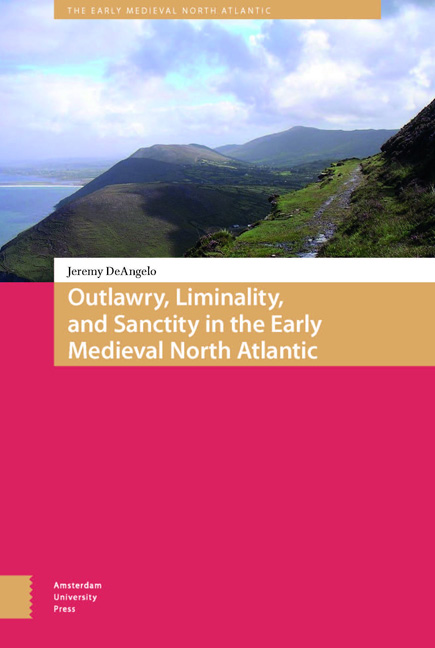Book contents
- Frontmatter
- Dedication
- Contents
- Acknowledgements
- Introduction: The Hermit and the Outlaw
- 1 Outlawry and Liminality in the North Atlantic
- 2 Imitating Exile in Early Medieval Ireland
- 3 Lessons of Conduct in Anglo-Saxon England
- 4 The Transgressive Hero
- 5 Cultural Exchange at the Boundaries of the Far North
- 6 Transgression in Transition after the Norman Conquest
- Bibliography
- Index
5 - Cultural Exchange at the Boundaries of the Far North
Published online by Cambridge University Press: 16 February 2021
- Frontmatter
- Dedication
- Contents
- Acknowledgements
- Introduction: The Hermit and the Outlaw
- 1 Outlawry and Liminality in the North Atlantic
- 2 Imitating Exile in Early Medieval Ireland
- 3 Lessons of Conduct in Anglo-Saxon England
- 4 The Transgressive Hero
- 5 Cultural Exchange at the Boundaries of the Far North
- 6 Transgression in Transition after the Norman Conquest
- Bibliography
- Index
Summary
Outlaws and Transculturalism
An obvious aspect of liminality in its physical form – the state of residing on boundaries – is its proximity to the foreign. Moving between polities naturally brings one into contact with the inhabitants of both. We have already seen how Guthlac's time as an outlaw placed him closer to the British territories and into the association of British peoples, and if the site of his hermitage, between Mercia and East Anglia, seems less diverse to us, that likely has more to do with modern ideas of ethnicity rather than medieval notions of difference. The people moving through the early medieval North Atlantic negotiated a patchwork of kingdoms, particularly in Britain and Ireland, whose divisions represented more than just politics. Wider travels, however, undoubtedly put the itinerant into contact with a greater variety of peoples and cultures. The Norse, both historically and in the Icelandic sagas, are unmatched in this regard, as their voyages brought them from Scandinavia to locations as diverse as Iberia, America, Novgorod, and Constantinople. The individuals at the vanguard of these explorations were adventurers and frequently outlaws; a prominent example is Eírik the Red, whose expulsion from Iceland led to his discovery of Greenland and laid the groundwork for his son Leif's journey to Vínland.
The reality of outlaws’ existence on the border means that their stories often function as depictions of what Mary Louise Pratt has called ‘contact zones’ – ‘social spaces where disparate cultures meet, clash, and grapple with each other, often in highly asymmetrical relations of domination and insubordination’. As she notes, the spaces in which such interaction occurs can vary quite a bit in type. For early medieval outlaws, it is worth pointing out that the contact zones encountered in the texts do not conform in most cases to the modern colonial examples Pratt works with. Instead, outlaw space is more like the borderlands described by Gloria Anzaldúa – areas between cultures, often divided politically, in which one culture and/or polity has hegemony over the others. Historians and archaeologists studying the early Middle Ages employ the term emporium to identify some of these spaces, where diversity was a consequence of trade.
- Type
- Chapter
- Information
- Publisher: Amsterdam University PressPrint publication year: 2018



